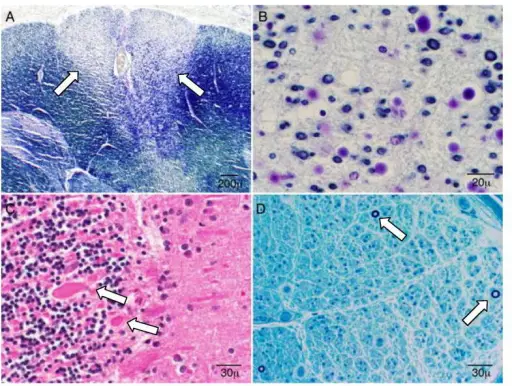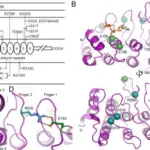
Hereditary Sensory Neuropathies. Autopsy (a-c) and nerve biopsy (d) results of an affected person (VI-36, deceased at 48 y.o.) from Kindred 1. Similar results were also seen in two other affected and deceased persons from kindred 1. (a) Ascending spinal sensory tract degeneration with profound myelin and axonal loss (lighter staining, between arrowheads), involving the gracile fasciculus (medial posterior columns) at all spinal levels; (b). The neuronal loss described in panel a is shown at higher magnification; (c) Chronic cerebellar Purkinje cell swelling and axonal loss (arrowheads) with associated hyperplasia of the Bergman glia. There was also severe neuronal loss and gliosis of inferior olivary nucleus as well as generalized cerebral atrophy with brain weight of 1085 (normal 1300-1400) grams without distinct histopathologic alterations or inclusions which was determined by Bielschowsky silver and immunohistochemical stains for detection of beta-amyloid, tau, TDP-43, and alpha-synuclein; (d) Epoxy embedded sural nerve tissue showing severe loss of large and small myelinated fibers with only few fibers remaining (arrows) without distinctive interstitial infiltrative change. Mutations in DNMT1 cause hereditary sensory neuropathy with dementia and hearing loss: Klein CJ, Botuyan MV, Wu Y, Ward CJ, Nicholson GA, Hammans S, Hojo K, Yamanishi H, Karpf AR, Wallace DC, Simon M, Lander C, Boardman LA, Cunningham JM, Smith GE, Litchy WJ, Boes B, Atkinson EJ, Middha S, B Dyck PJ, Parisi JE, Mer G, Smith DI, Dyck PJ - Nature genetics (2011). Not altered. CC.
Hereditary sensory neuropathies is a condition that emerges during childhood in which abnormalities of the nerves cause reduced ability to feel pain, reduced ability to sense cold or hot surfaces.
What is the Pathology of Hereditary Sensory Neuropathy?
The pathology of hereditary sensory neuropathy is:
-Etiology: The cause of hereditary sensory neuropathy is the mutation of genes.
-Genes involved: SPTLC1 gene.
-Pathogenesis: The sequence of events that lead to hereditary sensory neuropathy is the mutation of the genes responsible to finalize the sensory transmission is affected and the communication between the brain and the nerves is affected hence one is not able to sense a cold or hot surface despite the brain being aware of it.
-Morphology: NA.
-Histology: NA.
How does Hereditary Sensory Neuropathy Present?
Patients with hereditary sensory neuropathy typically are male present at the age range of 37 years. The symptoms, features, and clinical findings associated with hereditary sensory neuropathy include paresthesia, reduced ability to feel cold or hot, reduced ability to sense pain.
How is Hereditary Sensory Neuropathy Diagnosed?
Hereditary sensory neuropathy is diagnosed by nerve biopsies, nerve conduction study, physical examination, and blood tests.
How is Hereditary Sensory Neuropathy Treated?
Hereditary sensory neuropathy is treated with orthopedic surgery, pain medication, physical therapy.
What is the Prognosis of Hereditary Sensory Neuropathy?
The prognosis of hereditary sensory neuropathy is good with a normal life expectancy period.



